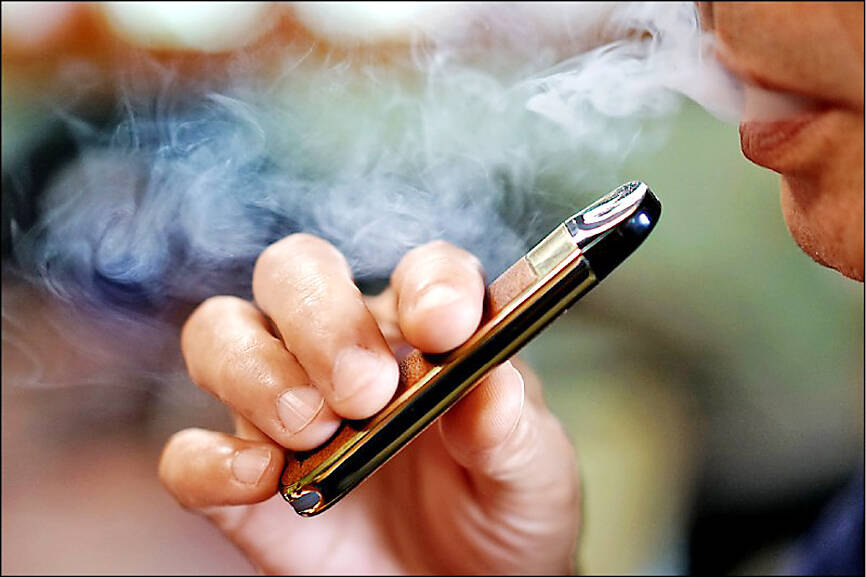More than 2,000 cases are being investigated a month after amendments to the Tobacco Hazards Prevention Act (菸害防治法) banned e-cigarettes and tightened restrictions on heated tobacco products (HTPs), the Health Promotion Administration (HPA) said yesterday.
Fines totaling NT$280,000 have been imposed in 18 cases, the HPA said.
The amendments were implemented on March 22, which also increased the age to buy cigarettes to 20, increased the size of required health warnings on cigarette cartons and expanded non-smoking zones in public spaces.

Photo: Taipei Times
HPA Tobacco Control Division head Chen Miao-hsin (陳妙心) said that the agency cooperated with Taiwan’s 22 local health departments to enhance inspections.
As of Friday, 6,100 suspected illegal items were discovered, with 5,495 items listed on online platforms and 605 items at brick-and-mortar stores, Chen said, adding that the number of brick-and-mortar stores that sell e-cigarettes and HTPs has gone down to 54 from 228.
Of the 6,100 items, e-cigarettes accounted for the majority, with 2,173 cases under investigation, Chen said.
Local health departments have asked the alleged perpetrators to submit statements, she said.
HPA data showed that about 67 percent of the 2,173 cases, or 1,453, were for allegedly selling e-cigarettes, 477 were for advertising e-cigarettes, 40 were for displaying e-cigarettes and 42 were for e-cigarettes or HTP use.
“What is worth noticing is that among the 42 cases of alleged illegal use, 41 involved people aged under 20,” Chen said.
Shih Hsin University Department of Journalism professor Chung Chi-hui (鍾起惠), who assisted in monitoring the sales of e-cigarettes and HTPs online, said that after the amendments took effect, some e-cigarette dealers began employing new marketing methods, such as not listing brand names and using terms such as “scented candles” or “perfumes.”
Some dealers hold online flash sales or frequently change accounts to sell the illegal items, and some only allow regular customers to place orders through private messaging, “customizing” the sales of e-cigarettes and HTP products, making inspections more difficult, Chung said.
HPA Deputy Director-General Chia Shu-li (賈淑麗) said that as HTPs must pass health risk assessments before they can be imported or sold, and as no such products have been approved, all e-cigarettes and HTPs that are available are illegal.
Inspections would continue, so people should not buy, advertise or use the products, Chia said.
People can report contraventions of the act along with evidence to their local health department or via the toll-free tobacco hazard consultation and reporting hotline 0800-531-531.

Taiwan is to commence mass production of the Tien Kung (天弓, “Sky Bow”) III, IV and V missiles by the second quarter of this year if the legislature approves the government’s NT$1.25 trillion (US$39.78 billion) special defense budget, an official said yesterday. Commenting on condition of anonymity, a defense official with knowledge of the matter said that the advanced systems are expected to provide crucial capabilities against ballistic and cruise missiles for the proposed “T-Dome,” an advanced, multi-layered air defense network. The Tien Kung III is an air defense missile with a maximum interception altitude of 35km. The Tien Kung IV and V

The disruption of 941 flights in and out of Taiwan due to China’s large-scale military exercises was no accident, but rather the result of a “quasi-blockade” used to simulate creating the air and sea routes needed for an amphibious landing, a military expert said. The disruptions occurred on Tuesday and lasted about 10 hours as China conducted live-fire drills in the Taiwan Strait. The Civil Aviation Administration (CAA) said the exercises affected 857 international flights and 84 domestic flights, affecting more than 100,000 travelers. Su Tzu-yun (蘇紫雲), a research fellow at the government-sponsored Institute for National Defense and Security Research, said the air

Taiwan lacks effective and cost-efficient armaments to intercept rockets, making the planned “T-Dome” interception system necessary, two experts said on Tuesday. The concerns were raised after China’s military fired two waves of rockets during live-fire drills around Taiwan on Tuesday, part of two-day exercises code-named “Justice Mission 2025.” The first wave involved 17 rockets launched at 9am from Pingtan in China’s Fujian Province, according to Lieutenant General Hsieh Jih-sheng (謝日升) of the Office of the Deputy Chief of the General Staff for Intelligence at the Ministry of National Defense. Those rockets landed 70 nautical miles (129.6km) northeast of Keelung without flying over Taiwan,

A strong continental cold air mass is to bring pollutants to Taiwan from tomorrow, the Ministry of Environment said today, as it issued an “orange” air quality alert for most of the country. All of Taiwan except for Hualien and Taitung counties is to be under an “orange” air quality alert tomorrow, indicating air quality that is unhealthy for sensitive groups. In China, areas from Shandong to Shanghai have been enveloped in haze since Saturday, the ministry said in a news release. Yesterday, hourly concentrations of PM2.5 in these areas ranged from 65 to 160 micrograms per cubic meter (mg/m³), and pollutants were